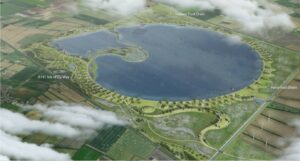
The Gardens Trust is launching a new volunteer training project examining Nationally Significant Infrastructure Projects (NSIPS) – large scale projects in England and Wales that are deemed critical to our national economic sustainability and climate resilience. It will research and record the designed landscapes within the areas around them and we’re inviting you to take part.
Historic Gardens & NSIPs
We are all increasingly aware of the problems that climate change presents to the survival of our historic parks and gardens: extreme weather, drought, flooding, plant diseases, and more, are growing threats. More generally, of course, accelerated climate change, coupled with rapidly growing population, demands immediate, collective action to mitigate its consequences and ensure a sustainable future for generations to come. The tricky part is achieving the right balance between the development needed to support the sustainable future of the country, which includes the sustainable management of historic assets, versus the potential impact on the significance and value of historic parks and gardens.
What are NSIPs?
NSIPs fall into five main categories of transport, waste, water, energy and wastewater, which can typically include reservoirs, very large solar arrays, windfarms, new motorways and trunk roads, and railways. In order to ensure that these critical projects are delivered more quickly, the Planning Act 2008 defines a bespoke process where developers apply to the Planning Inspectorate (PINS), rather than a local planning authority, for a Development Consent Order (DCO) rather than planning permission. An application would then go through six tightly prescribed stages, where the proposals are examined in detail by PINS on behalf of the Secretary of State, who makes the final decision.
Since the establishment of the process in 2008 there has been a steady increase in both the number and complexity of applications, as the impacts of climate change have become more evident, population pressures have increased, and policy changes have become more frequent in response to the changing economic environment and global insecurity. In response the government have committed to a “better, faster, greener, fairer and more resilient” NSIP process that ensures the effective processing of critical infrastructure projects that will be able to meet our infrastructure, energy and environmental needs.

NSIP concentrations
In England the regional breakdown of the more than 200 live NSIP applications shows that the majority are in the eastern regions, the densest concentrations being, at the time of writing, in the South- East (31), the East Midlands (33), Yorkshire and Humberside (45) and the largest number in the East of England (47). This concentration along the eastern coastline is due to a combination of higher levels of sunshine, its proximity to Europe and the North Sea which present optimal opportunities for solar arrays, piped energy and offshore wind farms. The UK is presently the global leader for offshore wind energy with an ambition to power every home in the UK this way, by 2030.
The South-East and East of England are also the most densely populated regions in England and have the hottest, driest summers, combined with more concentrated days of torrential rainfall. When these circumstances arise, rainfall runs off the hardened and developed land as surface water into rivers or causing flooding, rather than penetrating the ground to refill our aquifers (below-ground bodies of water). As both regions are heavily reliant on ground water (aquifers) for everyday needs, new surface water storage infrastructure, such as the proposed Fen Reservoir, is essential to capture that excess water and ensure taps continue to run, long into the future.
How might NSIPS affect Historic Parks & Gardens?
National infrastructure, particularly that related to climate adaptation, is essential to provide the UK with a resilient, sustainable and secure future and needs to be delivered quickly if we are to stay ahead of the environmental changes we are witnessing, year on year. The NSIP process is in place to ensure that the government’s ambition is delivered but that appropriate checks and balances are in place to protect our most significant historic and natural assets and take account of our places of historic merit and note.
In order to achieve this level of informed decision making, Historic England has recognised that a considerable number of designated and non-designated historic designed landscapes are likely to be impacted by NSIPS over the next few years and that a concerted effort of research is needed to better understand the nature and extent of that impact on these historic assets.

Green Futures – our new project
We’re delighted to have received funding from Historic England which will allow us to run a two-year volunteer training project – Gardens and NSIPs. Working with the six East of England County Gardens Trusts (Norfolk, Suffolk, Essex, Bedfordshire, Hertfordshire and Cambridgeshire), but sharing the online learning nationally, with the other CGTs and beyond, we’ll train volunteers to understand what NSIPs are; how to assess and engage with an NSIP application; and how to research, record and understand the significance of historic designed landscapes that may be affected by them.
By adding this research to the historic record, via platforms like Historic Environment Records and the National Heritage List for England, so that it is available to all, we can help developers, planners and statutory consultees like Historic England and the Gardens Trust to take into account the effect of NSIPs on historic parks, gardens and other designed landscapes, so that their most important aspects are protected.
Much of the training will be online, starting summer 2025: learning about NSIPs in May-June; and how to research potentially affected designed landscapes and record what remains on the ground in August. Key findings will then be worked into a travelling exhibition, which will move around public libraries in the East in summer 2026.
Based on an article written by Jo Barnes and Tamsin McMillan for the Winter 2024 issue of GT News.

Free Online Training
Our online training is freely accessible to anyone and includes webinars on:
- What are NSIPs?
- Understanding the NSIP application process
- Understanding Setting
- Understanding Significance
- How to Research Historic Parks and Gardens
- How to Record Historic Parks and Gardens
- Understanding Designations
- Sharing Your Park or Garden Research
All recordings and training resources can be accessed via our Resource Hub or YouTube channel.
Get involved!
All the training is suitable for absolute beginners and we’d love anyone with an interest to take part, whether you’re a volunteer, landscape owner or manager, or someone working in the sector.
You can get involved or stay updated on the project by:
- Watching our project launch Webinar on YouTube
- Signing up to our e-bulletin for regular updates
- Getting in touch with your local County Gardens Trust
- Following us on social media: Facebook / Instagram / YouTube / TikTok / LinkedIn
- or by signing up to volunteer on the project here
If you’d like any more information or have any questions about the project please contact Engagement Officer frankie.taylor@thegardenstrust.org
Download project resources
All materials and training from the project is freely accessible on our Resource Hub.


